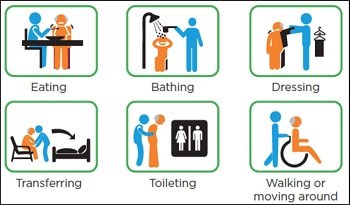The Aged Care Assessment Team (ACAT) assessment is an important process for older people who want to access My Aged Care services such as home care packages, respite care/transition care, and aged care homes.
The ACAT assessment is conducted by a qualified aged care assessor. The ACAT assessor will work with you and your family to identify the type and level of aged care services that you need. It will involve an interview, examination of your medical records and a physical assessment. The aged care assessment is a vital step in ensuring that you receive the government funded services that you need and deserve.
Here are SEVEN things you need to know about the ACAT assessment!
1) What Is The Aged Care Assessment Team (ACAT) Assessment?
An Aged Care Assessment Team (ACAT) assessment is a process that helps to determine what level and type of aged care services you may need. The assessment is designed to help you live as independently as possible.
The assessment is conducted by a qualified health professional, who will take into account the individual’s physical, psychological and social needs.
If you are eligible for government-funded aged care services, the ACAT assessment will be the first step in accessing the care you need.
A referral to ACAT is usually made when an older person needs help with personal care, nursing care or both, and is likely to benefit from a government-subsidised aged care service.
2) Guidelines The ACAT Assessors Follow For The Assessment.
ACATs conduct a comprehensive assessment of each person’s situation and needs. The aged care assessment considers the person’s needs on:
Medical
- Health condition/medical history
- Medication management
- Allergies and/or Sensitivities
Physical
- Function – activities of daily living (ADLs) and instrumental activities of daily living (IADLs)
- Physical health
- Personal health
Psychological
- Cognition
- Behavioural management issues
- Psychosocial issues
Social
- Social and community participation
- Family and other support networks
- Sustainability of caring relationships
Complexity/Vulnerability
- Level of complexity
- Vulnerability concerns
3) Things You Need To Prepare For The ACAT Assessment.
There are a few things you need to prepare for the ACAT assessment:
- Have your Medicare card and one other form of ID proof – such as DVA card, driver’s license, healthcare card, or passport
- Have a copy of any referrals from your doctor
- Consider if you would like a support person present such as a family member or your social worker
- Have any information you already have about aged care services that you may want to discuss
- Have contact details for your GP or other health professionals
- Consider if you need special assistance to communicate, such as a translator or an interpreter
- Have information on any support you receive.
4) Things To Know About The ACAT Assessment Process.
- The assessment process usually takes around two hours but can take longer if required.
- It involves a face-to-face interview with an ACAT assessor at your home.
- The assessor will ask questions about your current situation, health and wellbeing, and your care needs.
- They will also discuss your housing options and support network.
- Based on the information gathered, the ACAT team will make a recommendation about the level of care required and the type of aged care services that would be most suitable.
- They will also provide information about how to find an aged care service provider.
5) What Will Happen at the ACAT Assessment?
Gain your consent to begin with.
- Get your consent to do the aged care assessments.
- Get your permission to talk to people who support you, such as family, or your carer.
- You will be asked to complete an Application for Care Form.
The assessor will discuss with you about your care needs.
The assessor will have a copy of the information you gave to the My Aged Care contact centre. This gives them an idea of what support you might need to help you return to, or keep the level of independence needed to manage your day-to-day life.
The assessor will ask questions like:
- What support do you already have, and if it will continue
- Your health, lifestyle and any health concerns
- How you’re going with completing daily tasks and activities around the home
- If you have problems with your memory
- Any issues relating to home and personal safety
- Family and community activities
- Speaking to your GP or other health professionals.
The assessor will discuss and develop a support plan with you.
- Your strengths
- Your difficulties
- Your goals
- What you would like to achieve
- What preferences you have for your services
Prepare your questions to ask.
For example:
- What services are available to help me reach my goals?
- What services are available locally, and what are the waiting times?
- What supports are there for my carer?
- Are there service providers that speak my language or represent my religious or cultural beliefs?
- How can I contact the assessor if I have any questions after the assessment?
6) What Results Should You Expect From The ACAT Assessment?
There are four main types of aged care services in Australia:
- The Commonwealth Home Support Programme (CHSP) provides basic services such as home maintenance and transport to medical appointments.
- Home Care Packages (HCPs) provide long-term support for people who wish to remain living in their own homes.
- Short-Term Restorative Care (STRC) helps people regain independence after a hospital stay.
- Residential Care is for people who can no longer live independently and need 24-hour care.
7) When Will You Get A Result From the ACAT Assessment?
The ACAT assessor uses gathered information to prepare a support plan that recommends the aged care services that would best meet your needs. You will receive a copy of the report by post/email. This is usually sent within two to six weeks after your assessment. You are then free to choose whether or not to accept the recommendations.
Tips for Choosing an Aged Care Service provider.
There are a few things to keep in mind when choosing an aged care provider.
- Consider your needs and budget.
- Think about the location of the service. Aged Care service providers are available all across Australia, so you can choose one that’s close to home.
- Make sure to read the reviews of Aged Care service providers before choosing one. This will help you get an idea of what others have thought about the quality of care they’ve received.
Conclusion.
The ACAT assessment is a process that is used to determine what appropriate levels of care and support an individual may need. It is important to understand the different aspects of the assessment in order to be prepared for it. Results from the ACAT assessment can take up to six weeks to receive, and you are free to accept or reject the recommendations made.
If you have any questions about ACAT assessments or aged care services in general, please don’t hesitate to get in touch with us or visit the My Aged Care website. We’re here to help!







